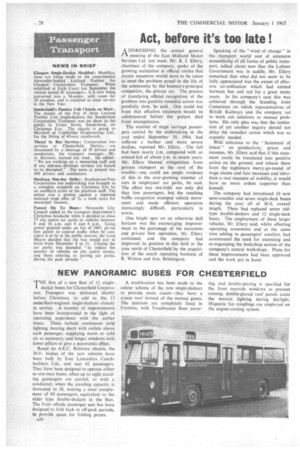Act, before it's too late !
Page 28

If you've noticed an error in this article please click here to report it so we can fix it.
ADDRESSING the annual general meeting of the East Midland Motor Services Ltd. last week, Mr. R. J. Ellery, chairman of the company, spoke of the growing realization in official circles that drastic measures would have to be taken to meet the problem posed to the life of the community by the busmen'Oprincipal competitor, the private car. The process of translating official recognition of the problem into positive remedial action was painfully slow, he said. One could but hope that effective treatment would be administered before the patient died from strangulation.
The number of stage carriage passengers carried by the undertaking in the year ended September 30, 1964, had suffered a further and more severe decline, reported Mr. Ellery. The fall had been nearly I m. compared with an annual fall of about m. in recent years. Mr. Ellery blamed competition from private transport as the root of the trouble—one could see ample evidence of this in the ever-growing number of cars in employees' car parks, he said The effect was two-fold; not only did they lose passengers, but the resulting traffic congestion cramped vehicle movement and made efficient operation increasingly difficult, particularly in towns.
One bright spot on an otherwise dull horizon was the encouraging improvement in the patronage of the excursion and private hire operation, Mr. Ellery continued, and the company had improved its position in this field in the area north of Chesterfield by the acquisition of the coach operating business of R. Wetton and Son, Brimington. Speaking of the "wind of change" in the transport world and of extensive streamlining of all forms of public transport, talked about now that the Labour Government was in saddle, Mr. Ellery remarked that what did not seem to be fully appreciated was the extent of effective co-ordination which had existed between bus and rail far a great many years. in his company's case this was achieved through the Standing Joint Committee on which representatives of British Railways and the company sat to work out solutions to mutual problems. His only plea was that the institution of yet another inquiry should not delay the remedial action which was so urgently needed.
With reference to the Statement of Intent" on productivity, prices and incomes. Mr. Ellery said that if this statement could be translated into positive action on the ground, and release them from the nightmare merry-go-round of wage claims and fare increases and introduce a real measure of stability, it would have no more ardent supporter than himself.
The company had introduced 10 new semi-coaches and seven single-deck buses during the year, all of 36 ft. overall length. These had replaced seven oldtype double-deckers and 12 single-deck buses. The employment of these larger vehicles, Mr. Ellery said, whilst effecting operating economies and at the same time adding to passengers' comfort, had accentuated the need for extending and re-organizing the bodyshop section of the company's central workshops, Plans for these improvements had been approved and the work put in hand.




























































































